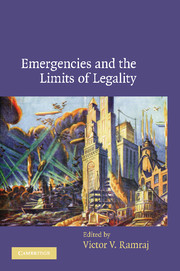Book contents
- Frontmatter
- Contents
- List of contributors
- Preface
- Introduction
- PART ONE Legality and extra-legality
- PART TWO Conceptual and normative theories
- PART THREE Political and sociological theories
- 6 The constitutional politics of emergency powers: some conceptual issues
- 7 A topography of emergency power
- 8 Law, terror and social movements: the repression-mobilisation nexus
- PART FOUR Prospective constraints on state power
- PART FIVE Judicial responses to official disobedience
- PART SIX Post-colonial and international perspectives
- Index
- References
6 - The constitutional politics of emergency powers: some conceptual issues
Published online by Cambridge University Press: 10 August 2009
- Frontmatter
- Contents
- List of contributors
- Preface
- Introduction
- PART ONE Legality and extra-legality
- PART TWO Conceptual and normative theories
- PART THREE Political and sociological theories
- 6 The constitutional politics of emergency powers: some conceptual issues
- 7 A topography of emergency power
- 8 Law, terror and social movements: the repression-mobilisation nexus
- PART FOUR Prospective constraints on state power
- PART FIVE Judicial responses to official disobedience
- PART SIX Post-colonial and international perspectives
- Index
- References
Summary
How are norms regulating the organised exercise of public coercion – that is, state power – embedded in institutions? Legal scholars tend to assume that law provides the only institutional form for the normative regulation of state power. Starting from the competing positions of Professors Dyzenhaus and Gross, I argue here that we can regulate state power through a normatively infused politics. My argument is largely conceptual – that is, aimed at establishing the possibility of such a politics. I leave to another day the identification of the empirical circumstances under which such a politics can arise and offer a realistic alternative to legal regulation of state power.
Professors Dyzenhaus and Gross disagree over how law should regulate the exercise of emergency powers, but, I will argue, both start from a conceptual framework in which only law has value that is simultaneously normative and institutional. Strikingly, Professor Dyzenhaus, who seems more deeply committed to the exclusivity of law as a system of normative regulation of state power, actually leaves more space for a normatively infused politics than does Professor Gross. I will argue as well that we ought to acknowledge the possibility, and the fact (on occasion), that the institutions of ordinary politics can be the vehicle for normative regulation of the exercise of emergency powers.
- Type
- Chapter
- Information
- Emergencies and the Limits of Legality , pp. 145 - 155Publisher: Cambridge University PressPrint publication year: 2008
References
- 8
- Cited by



